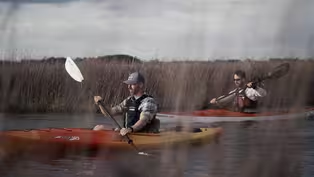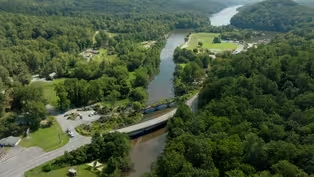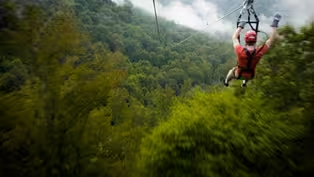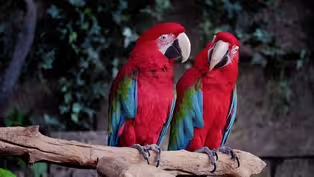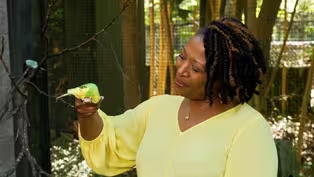
Connect with Nature
Season 21 Episode 4 | 26m 46sVideo has Closed Captions
NC Weekend explores a park for endangered birds and a flowering bridge in Lake Lure.
Explore an expansive park for endangered birds from around the world in Halifax County and a flowering bridge in Lake Lure. Then zipline through the mountains of Asheville with Navitat Adventures.
Problems playing video? | Closed Captioning Feedback
Problems playing video? | Closed Captioning Feedback
North Carolina Weekend is a local public television program presented by PBS NC

Connect with Nature
Season 21 Episode 4 | 26m 46sVideo has Closed Captions
Explore an expansive park for endangered birds from around the world in Halifax County and a flowering bridge in Lake Lure. Then zipline through the mountains of Asheville with Navitat Adventures.
Problems playing video? | Closed Captioning Feedback
How to Watch North Carolina Weekend
North Carolina Weekend is available to stream on pbs.org and the free PBS App, available on iPhone, Apple TV, Android TV, Android smartphones, Amazon Fire TV, Amazon Fire Tablet, Roku, Samsung Smart TV, and Vizio.
Providing Support for PBS.org
Learn Moreabout PBS online sponsorship[piano intro] - Next on "North Carolina Weekend," join us as we connect with nature from Sylvan Heights Bird Park.
We'll visit the Lake Lura Flowering Bridge and take a zip line ride with Navitat.
Coming up next.
- [Narrator] Funding for "North Carolina Weekend" is provided in part by Visit NC, dedicated to highlighting our state's natural scenic beauty, unique history and diverse cultural attractions.
From the Blue Ridge and the Great Smoky Mountains, across the Piedmont to 300 miles of barrier island beaches, you're invited to experience all the adventure and charm our state has to offer.
[upbeat bluegrass music] [upbeat bluegrass music continues] [upbeat bluegrass music continues] - Welcome to "North Carolina Weekend" everyone.
I'm Deborah Holt Noel, and this week we are connecting with nature by visiting places around the state that let us get out, experience wildlife and celebrate nature's bounties.
Right now I'm at Sylvan Heights Bird Park in Scotland Neck, one of our favorite places to visit, Sylvan Heights is a bird sanctuary where you can get up close and personal with dozens of species of birds and we'll explore it more throughout the show.
But first, let's head to Lake Lure, where a bridge is more than just a way to cross the highway, it is the destination.
Producer Clay Johnson and his videographer, Erik Olsen, take us there.
[bright music] - [Kathy] I love the fact that they saved this old bridge.
- [Clay] This old bridge is the Lake Lure Flowering Bridge.
It's essentially a 20 foot wide, 155 foot long garden with a dozen flower beds, each with its own theme.
- [Kathy] Well, it's about 2000 different types of plants and I think it's 35 different hydrangeas and about 32 different roses.
- [Clay] It all started in 2007 when the Department of Transportation was planning to build a new bridge next to the old one, crossing the Broad River between Chimney Rock and Lake Lure.
When the new bridge was finished, the DOT donated the old bridge to the town.
The town planned to make it a pedestrian walkway, but a group of local residents told town officials they wanted to make it more, a garden.
- [Kathy] They were behind it from the very beginning and could see that the community really wanted to do this.
- [Clay] The group formed a nonprofit called Friends of the Lake Lure Flowering Bridge in 2011 and started raising money.
- We are a great group of friends, very dedicated and we have a very dedicated community around us.
- [Clay] The organization made sure the nearly-100 year old bridge was structurally sound for the plan and worked with a landscape design firm on the layout.
The new Flowering Bridge opened in 2013.
The effort was and still is, all volunteer.
- They are the backbone.
Each person kind of takes an area of the garden and they specialize in it.
- This is my garden, which is the pollinator garden.
And I just need to prune it and weed it and put flowers in it and keep it looking good for everyone.
I love working in the garden and this is just something I could do for the community.
- [Clay] The volunteers add features like whimsical statuettes, sculptures and other art.
- And we have some of the Lake Lure artists that don't necessarily volunteer in the gardens but they like to do the features and so they'll put a feature together and say, "Where would you like this?"
- [Clay] The Rivers Edge Dog Garden honors people's pets.
- [Kathy] There's a little box planter down there with scented plants that dogs like to smell and a stick library where they can get a stick from the library and take home with them.
- [Clay] There's a rainbow bridge where people hang the collars and tags of their lost pets.
- [Kathy] It's a very healing place.
- [Lexi] Bird, yeah, what does a bird say?
- Tweet tweet.
- [Lexi] Tweet tweet.
- [Clay] For Lexi Rodriguez and her 18 month old daughter, Poppy, this is a place for learning.
- I get to talk to her about weeding a garden when we see the volunteers weeding or watering the tomatoes and how that makes the tomatoes grow and just kind of some experiences that we don't get in our daily lives back home.
She gets more out of this than I possibly know and she's gonna go home and three days from now say something and I'm not gonna get it, but it's gonna be something she picked up here.
- [Clay] Education is the Flowering Bridge's core mission.
The plants have tags and corresponding lists that identify them.
- [Kathy] A lot of visitors will look at that tag and then take a picture of the list that they can then take home because it's an idea garden.
There are so many small spaces here that visitors can look at that and say, "Oh, I can do this at home."
- [Clay] The Flowering Bridge conducts classes in gardening and hosts school groups.
It's raising money for an onsite education center so it can still do that during bad weather.
The Lake Lure Flowering Bridge is one of only two of its kind in the country and attracts about 180,000 visitors a year.
- They really appreciate it, so that kinda gives me a sense of satisfaction.
I want 'em to see the beauty of nature.
I want 'em to appreciate it.
I want 'em to learn.
I think we need to save this old Earth [chuckling].
[bright music] [bird chirping] - [Deborah] The Lake Lore Flowering Bridge is at 3070 Memorial Highway in Lake Lure and it's open daily.
For information about this popular community garden, go online to lakelurefloweringbridge.org.
Right now I'm with Dustin Foote, Director of Aviculture here at Sylvan Heights Bird Park.
Dustin, tell me who is behind this cage?
- Yeah, so these are some of our newest birds.
These are Southern cassowaries.
So they're native to Australia.
They're a really, really big bird.
They're one of the largest birds in the world.
And what's really cool about these guys is they're considered living dinosaurs.
- [Deborah] Oh yeah.
- [Dustin] So if you've seen the movie "Jurassic Park", velociraptors that most kids know about, this is about as close as you can get to a living dinosaur these days.
- Wow, the cassowary really is an amazing bird and of course it helps to have the right gear if you're gonna be connecting with nature, right?
Well, for more than 50 years, the Great Outdoor Provision Company has been outfitting campers, kayakers, even rock climbers and more.
So we sent Rick Sullivan to go learn more about their story and their mission.
[bright music] - I think a place like this is really unique because retail seems to be shrinking with big box stores and internet commerce.
So it's really cool to be in a shop that feels homegrown and feels family-like.
- I just really like the vibe of the store and I really like the people.
- Well, I think it's really important for us to find people who love the outdoors, number one, and that people are good communicators and able to share their love of the outdoor gear with customers.
- Got a nice keel on it, so it does track pretty good for a 10 foot boat.
- [Rick] Great Outdoor Provision Company got its start in the back of a bike shop in Carrboro back in 1972.
Today there are nine stores, seven of them in North Carolina, including this one in Chapel Hill.
It's been slow and careful growth and that goes for the hiring of staff, many of the employees having 10 or more years of experience in the company and even more than that in the great outdoors.
- So I've been here since 1998.
I was a college student at NC State when I started here 'cause I like backpacking and I wanted good deals on lots of equipment.
- I've been here almost 14 years.
I was really introduced to the outdoors working at the summer camp that I went to in the White Mountains of New Hampshire growing up.
So I've been backpacking since I was pretty young.
- My dad had been working for the company since '80, '83?
- [Rick] John Millsaps is the son of company co-owner, Chuck Millsaps.
- Growing up with my dad, I was immediately interested in the outdoors from camping, paddling.
But I would say in addition to the outdoor interest, it's mainly just the opportunity to see my dad every day and get to work with him.
- [Rick] The family and friendly feel of Great Outdoor Provision Company employees is one they hope is shared with their customers, who enter their stores in search of high caliber outdoor equipment or even just expert advice.
- The people that come in here aren't just coming here because they like the stuff that we sell and they think we have a beautiful store, even though they do.
They like to have a real one-on-one experience with staff and it's great to work with people who have experience in the outdoor industry and are excited to share it.
- We wanna be a shop that's the public library of the outdoors where you can come in, you can find answers to questions and you're not gonna feel a high pressure environment.
We employ some people who've been to the top of the seven summits, who've been to Everest, who've hiked the Pacific Coast Trail, the Appalachian Trail, but we also employ people who are just passionate, local hikers.
- [Rick] One of the folks on staff on the morning I filmed this story, had expertise in hiking but also dog training.
And Great Outdoor Provision Company very prominently welcomes friendly pups.
After all, they are often camping and hiking companions themselves.
- I like camping with my dog.
So I've gone camping by myself numerous times but having my dog with me, just really adds another level of complexity and fun to the whole experience.
- [Rick] With natural features, including everything from fields to streams and mountains to coast, the outdoor business in North Carolina is super competitive and Great Outdoor Provision Company likes it that way.
- We're really not trying to make our slice of the pie grow, we just want the whole pie to grow.
There's been kind of an evolution of the outdoor marketplace and I think part of the reason that we've experienced success over the years is because we are geographically bound in this North Carolina, Virginia area.
It makes it easy for us to identify the products that our customers in this region would like.
We can really put together a special menu for people that are gonna be here in this area and find them the right things for the climate that we're in.
- The Great Outdoor Provision Company has several locations in our state.
Raleigh, Chapel Hill, Greensboro, Greenville, Wilmington and Winston-Salem and they're all open daily.
For more information, visit their website at greatoutdoorprovision.com.
I'm here with Michael Lubbock, the founder of the Sylvan Heights Bird Park here in Scotland Neck.
Mike, thank you so much for hosting us.
Tell us, how did all of this get started?
- Well we've been doing it longest time keeping birds.
But the park we've had now 17 years.
And it came about that just breeding birds and moving them around, and selling them at the time, wasn't enough, so a friend of mine who is a Bronx Zoo director said, "You should get a place to open to the public and then you'll help save all your birds."
'Cause we had the largest collection of waterfowl anywhere in North America and some of them very rare and endangered.
So that's why we opened the park.
- [Deborah] Wow, the largest collection.
That's very impressive.
So what's the mission here?
- [Mike] Well, the mission to start with, was the endangered species, trying to save them.
And then as the park grew, education became very important.
I mean the next generation's got to take this on.
So that's one of our missions.
- [Deborah] And why are we losing so many birds?
- [Mike] Well, the habitat basically, all over the world and if we can't get the habitat right, we can breed the birds but we can't put them back with no habitat.
So it makes it very difficult and so that's what we have to work on.
- [Deborah] Mike, tell me a recent success story.
- A recent one is Brazilian mergansers in Brazil.
This is a fish eating duck that lives on the rivers, the clear rivers, 'cause they've gotta see the fish.
And the problem is they went down to very few and the Brazilian government, took 10 years for them to give permission to get some eggs and bring them in from the wild.
Since then, I think we've reared damn near 60 again and we're now looking at other rivers that we can protect and put them back into the wild.
So, we're working hard, but as I said, habitat is a problem.
- And what can people do to help this effort?
- Well, I mean, probably stop cutting trees down and all kinds of stuff like that, which will never happen.
- [Deborah] So deforestation would be helpful.
- [Mikes] Is a bad one, yeah.
Humans are the ones that are making these birds rare.
- This is my very first time to Sylvan Heights Bird Park.
And probably a lot of people haven't been here.
So when they come what should they do?
What's the whole experience all about?
- I mean, the pen behind us is the first one you see when you come in, all the flamingos.
So they're already committed and you are inside the pen, you forget about the netting above you.
Then you see the ducks and things, then you start to walk around and by the time they leave, they will have seen more birds than ever seen before.
- [Deborah] What do you think it is about that bird human connection that makes a visit to Sylvan Heights so special?
- The problem is that people see birds on television and lots of wonderful nature programs, but you're not sort of close to those birds.
You see what the camera sees.
When you're here, you see what you see and you have that sort of better feeling, but it's difficult to explain, but that's what happens.
- Well, I can't wait to see more of it.
Thank you so much.
- Not at all.
- Sylvan Heights Bird Park is at 500 Sylvan Heights Parkway in Scotland Neck and they're open every day except Monday from 9:00 AM to 5:00 PM.
For more information, give them a call at 252-826-3186 or go online to shwpark.com.
Dustin, we have some really pretty pink birds here.
What are these?
- Yeah, so these are roseate spoonbills.
- Yes.
- They're actually native to North America.
You can see where they get their name.
They have that nice wide spoon-like bill that they'll stick in the mud and look for crustaceans, fish, pretty much anything they can find.
And you'd be amazed to know how many nerves are actually in that bill.
It's really, really sensitive.
So they can feel pretty much anything almost instantly.
And they're really, really good at finding things in the mud.
- [Deborah] So where are they raised and how do you care for them here?
- So these five individuals were actually raised here at the park.
We received them as eggs from other facilities and the avicultural team here hand-reared them.
And so, they're used to people, they still know they're spoonbills, but they're pretty used to people.
- Native Americans have a long tradition of honoring nature and some of the foods we enjoy come from some of those traditions.
Culinary artist, Seraphim Smith spent some time with the Coharie tribe and learned a lot about their amazing sorghum syrup.
[gentle music] - I'm Seraphim Smith and I'm a culinary artist living and creating in eastern North Carolina.
Today I'm taking you to Sampson County, specifically to the Coharie Indian Tribal Center.
The Coharie tribe settled around Clinton nearly 300 years ago.
Currently, there are about 3000 members.
The tribe has been making a traditional sorghum syrup for centuries, and the chief and elders are about to teach me the secret of its sweetness.
[gentle music continues] - You would cut those stalks, you would take all the leaves off of it, but then you would take, and the stalk, it would be bigger at the bottom than it would be at the top.
Well, it goes between these two wheels right here, you see.
That would be working from the PTO off of a tractor, we'll show you that one row tractor we got in there.
But it is turning, you know, fairly slow.
But then the juice runs out here.
- And the stalk goes out the other side.
- Yeah, the stalk comes out the other side.
- Pulverizes the stalk.
- [Randy] Now back in the day, you would have this same set up here, but you would have a mule with you, wouldn't you, Daddy?
- [Dad] And the mule was the way I turned, goes round and round, round and round.
- [Randy] Get back beside this and get a better picture of it.
You can see, see the burners?
There's 12 burners, they're all going at one time.
This is completely full of 75 gallons of fluid.
Cooks for about five and a half hours.
- When the caramelization process is complete, they have sorghum.
Proceeds from the sorghum go to support their community garden.
When you visit the Coharie Indian Tribal Center, make sure to visit the room that has this very special canoe in it.
This canoe is very old.
They think it's about 500 years old at least.
And they were able to find it when they were cleaning the Little Coharie River in the last few years.
You'll notice that the canoe has a black inside and what this is, is a charring from when the Indians took fire and used it to eat at the wood.
And then they would take another tool and they would chip away at the charring and that was how they were able to hollow out this canoe.
This canoe is very special to the Coharies because it appeared to them when they were cleaning the river.
Something got dislodged while they were cleaning the muck and all of a sudden, this canoe shot up straight out of the river, almost like a validation, a spiritual validation, to affirm that the Coharies were doing the right thing by taking care of their ancestral waterway.
There are many artifacts to see, as well as an incredible collection of oil portraits created by North Carolina artist, Stephen Greer.
It is important to the Coharies to care for every family member through the different programs that the center provides.
One of the most remarkable and beautiful things about this community is their generosity.
Their garden's bounty is available to all, whether you are Indian or not.
- That's some good stuff right there.
- Incredibly, their harvest of okra, turnips and other southern favorites are able to nurture nearly half of Sampson County.
I love to paint the vegetables of Eastern North Carolina and I also love visiting with such wonderful people, like the Coharies.
The syrup can be bought directly from the Coharie Tribal Center or by going to their website.
The earthy sweetness of the Coharie tribe and their sorghum is something that I'm going to savor for a long time.
- The Coharie Tribal Center is at 7531 US 421 in Clinton, and that's a great place to buy their sorghum syrup.
For more information, go to coharietribe.org.
There are all kinds of ways to connect with nature, hiking, camping, kayaking, even zip lining.
Come with us around the mountains of Asheville as we plunge through the canopy with Navitat Adventures.
- Navitat is a zip line company here in Asheville, North Carolina.
We offer three different tours and they try to appeal to as many people as possible, families, adults, and beyond.
- Navitat was founded here in 2010 in the Asheville area.
I know that the owners looked around for a lot of places and found this gorgeous, spot out here that we call Moody Cove.
It's a piece of property that has been owned by the same family since pre-Civil War times.
They homesteaded it and it's just a gorgeous place that we are so thrilled to get to have.
- We chose this location simply because of its beauty and just saw the amazing potential that there was to build a zip line course like no other.
- So our full treetop tour is pretty awesome.
It's kind of your traditional canopy tour.
We're going from tree to tree on a single line system.
This was originally homesteaded.
There's lots of fruiting trees in the spring, so we see lots of beautiful flowers and really just awesome color change in the fall.
I would say our scenery really sets us apart.
- Our most popular tour is the Mountaintop Tour.
It's what we're known for here at Navitat.
It has three zip lines that range from 1100 feet to 3600 feet long.
It gives you amazing views of the Blue Ridge Parkway and the mountains out here.
Having side-by-side zip lines is a really unique feature of Navitat and our mountaintop course.
It allows two people to zip down the mountain together and will allow you to kind of soak up those views with someone next to you.
It's a really unique selling point for us.
- [Victoria] The Treetop Express Tour is great, especially if it's your first time zip lining or if you're zip lining with smaller children, we're able to accommodate about kids up to five years old and take 'em through the tour for their first time or if you have somebody who's elderly or not necessarily able to navigate one of our bigger courses, it's very accessible and easy for them to go through.
- We also offer RTV shadow tours.
So these are designed for guests who do not want to participate in the zip line tours or cannot for some reason, so they can accompany the rest of their family out on the tour, shadowing them in a guide-driven RTV.
It's a really fun experience.
It allows them to be part of the action without having to actually participate in the zip lining tour.
- One of my favorite things about being at Navitat is how accessible the tours can truly be.
I have tandemed with five-year-olds that are hardly tall enough to go on any other rides or roller coasters or anything like that in the world, but they just get to experience something so unique and fun.
My oldest guest was a 92 year old.
It was wonderful, we actually drove him between platforms to make sure that he could get to everything without having to walk.
Just love to make it as accessible as we can for people.
It's a joy.
- I like that we also got to like hike and learn about nature during our zip.
The zips are super high up, so it's not just like a backyard zip, get to go pretty fast.
- We have amazing views, the highest, the fastest, the longest lines.
This is what makes Navitat unique and I think our guides also have a big impact on our guests.
- The guides are very knowledgeable with everything from the animals that we have in the area, the plants that we have in the area, the history of the property, the history of Navitat, so they get kind of like a history lesson.
They also get some information and some education on the flora and fauna that we have in this region.
We do have a very unique area here, so we definitely like to give all of our guests that experience.
We'll have people come in and while they're checking in, they'll say, "I'm really nervous to do this.
I don't know if I want to do it."
Even from that point, they're able to make them feel a little bit easier about it, make them feel a little bit more comfortable about it, by saying that our guides are gonna be with them the whole time.
Our guides are very encouraging, so we definitely want to kind of push people past their comfort zone.
So we always wanna make sure that someone is having a good experience.
- My favorite part about Navitat is that it's about 240 acres here of just like pure untouched land, and it's rare to find that anywhere else.
The zip lines are very large and fast and fun.
- Asheville is a wonderful location for a zip line or any adventurous activity because we are nestled in the Blue Ridge Mountains, one of the most beautiful places on the planet and one of the most bio diverse places on earth.
Navitat, in particular, is in a beautiful, what we call an Appalachian-rich cove environment.
And of course, going from mountaintop to mountaintop and getting to look down at such a beautiful place is just breathtaking.
- Navitat Canopy Adventures is at 242 Poverty Branch Road in Barnardsville and they're open every day from 8:00 AM to 5:00 PM.
To book your adventure, give them a call at 828-626-3700 or visit them online at navitat.com.
Hey pretty bird.
We've had a great time out here at Sylvan Heights Bird Park in Scotland Neck, it's a great place to visit, see rare birds and also help with conservation.
And if you've missed anything in today's show, just remember you can always watch us again online at pbsnc.org or you can find us on our YouTube channel.
Have a great North Carolina weekend everyone.
Hey, beautiful bird.
[upbeat music] [upbeat music continues] - [Narrator] Funding for "North Carolina Weekend" is provided in part by VisitNC, dedicated to highlighting our state's natural scenic beauty, unique history and diverse cultural attractions.
From the Blue Ridge and the Great Smoky Mountains, across the Piedmont to 300 miles of barrier island beaches, you're invited to experience all the adventure and charm our state has to offer.
[upbeat tones]
Great Outdoor Provision Company
Video has Closed Captions
Clip: S21 Ep4 | 4m 36s | Learn the story and mission of the popular NC outfitter. (4m 36s)
Video has Closed Captions
Clip: S21 Ep4 | 4m 15s | Visit a spectacular bridge near Chimney Rock that features 30 exquisite gardens. (4m 15s)
Video has Closed Captions
Clip: S21 Ep4 | 5m 28s | Experience a thrilling zipline ride through the Blue Ridge Mountains near Asheville. (5m 28s)
Video has Closed Captions
Clip: S21 Ep4 | 3m 29s | Learn about a conservation and breeding center for endangered birds in Scotland Neck. (3m 29s)
Video has Closed Captions
Preview: S21 Ep4 | 20s | NC Weekend explores a park for endangered birds and a flowering bridge in Lake Lure. (20s)
Providing Support for PBS.org
Learn Moreabout PBS online sponsorshipSupport for PBS provided by:
North Carolina Weekend is a local public television program presented by PBS NC
